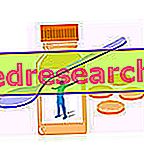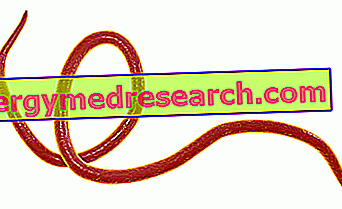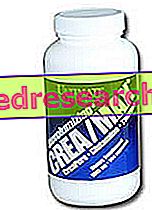Generality
With the wording "cough coughing" we want to indicate a type of particularly insistent and obstinate cough that causes not a few discomforts to the patient who suffers from it.

An irritated cough is not a disease in itself, but a symptom that derives from causes of different origins and nature.
However, although this is a symptom, this type of cough is able to give rise to other disorders that can further worsen the patient's condition. In addition to this, especially when caused by factors of a pathological nature, the irritated cough is accompanied by other symptoms with more or less high severity.
The treatment of this type of cough is basically related to the treatment of the root cause. In some cases, however, to alleviate the irritated cough and the discomfort caused by it, it is possible to resort to the use of natural remedies or drugs, of course, subject to medical advice.
What is that
What is an irritating cough?
As mentioned, when we talk about an irritated cough we refer to an incessant, insistent cough and, for this reason, extremely annoying to bear . This definition does not refer to other features of cough, such as, for example, the presence or not of sputum (phlegm). For this reason, the term "sneezing cough" could be used to indicate both a fat cough and a dry cough, as long as it is obstinate and difficult to bear. However, in common parlance, when we talk about an irritated cough, it is customary to refer to a particularly dry cough that leads to considerable irritation of the throat.
However, a cough - like any other type of cough - is not a pathology, but a symptom that can be caused by various factors. More precisely, as a rule, the cough is considered as a defensive mechanism implemented by the organism in order to protect and free the airways from potential dangers (irritants, allergens, etc.).
Causes
Causes of Responsible Coughing
As mentioned, there are many causes that can lead to the appearance of an irritated cough and can have different origins and nature.
However, only the main causes leading to the appearance of a dry or possibly poorly productive cough will be considered below. Going into detail, the aforementioned irritated cough can be caused by:
- Inhalation of irritating substances, such as smog, dust, tobacco smoke, volatile and irritating chemical substances, toxic substances, etc .;
- Allergies : an irritated cough can be caused by the inhalation of substances to which the patient is allergic, such as, for example, pollens, dust, etc .;
- Asthma : an irritated cough is one of the typical symptoms of asthma; in this case, generally, it tends to manifest itself more frequently during the night, or upon awakening;
- Infections with subsequent inflammation of the airways (tracheitis, laryngitis, bronchitis, bronchiolitis, etc.): an irritated cough is often the symptom of airway infections and, in most cases, it occurs in the presence of viral infections .
- Other diseases or pathological conditions of the respiratory system, such as, for example, COPD (chronic obstructive pulmonary disease), bronchitis, pleurisy or pleural effusion.
- Bronchial and pulmonary tumors : at times, the cough may be a symptom of tumors located in the bronchi or lungs; in particular, a dry irritative cough tends to manifest itself above all in the initial phases of this type of neoplasias.
Finally, in some cases, the coughing and dry cough may be the consequence of taking some types of drugs (for example, antihypertensive drugs) for which the cough is a known side effect.
Associated symptoms
Symptoms that are manifested in association with an irritating cough
Symptoms that may occur in association with an irritated cough strongly depend on the cause that caused it.
Inhalation of Irritating Substances
When the irritated cough is caused by the inhalation of irritating substances, it can manifest itself as the only symptom, possibly in association with irritation of the airways.
Asthma and Allergies
When the cough is a symptom of asthma, it can manifest along with symptoms such as:
- Sense of chest tightness;
- Wheezing breath;
- Breathing difficulties manifested by shortness of breath, wheezing and dyspnea.
If, on the other hand, the cough is a consequence of other respiratory allergies, it can be associated with symptoms such as:
- Dry throat;
- Closed nose;
- Eye redness;
- Itching of the nose and / or throat;
- Sneezing;
- runny nose;
- photophobia;
- Burning eyes.
Airway infections
In the presence of infections of the respiratory system, the coughing irritation can be accompanied by symptoms such as fever, generalized malaise, fatigue and exhaustion, sore throat and stuffy nose.
Other Diseases of the Respiratory System
In the event that the irritating cough is the symptom of respiratory diseases, such as chronic obstructive pulmonary disease, pleurisy, bronchitis, tumors, etc. the symptomatology can be varied and complex. For more information on this, therefore, we recommend reading the dedicated articles already on this site.
Disorders Caused by the Presence of Angry Cough
As mentioned, the irritating cough, regardless of the cause that triggered it, could give rise to other disorders precisely because of its insistent and incessant nature. Among these disorders, we recall:
- Irritation and pain in the throat;
- Hoarseness;
- Chest pain caused by continuous tussive stimulation. The painful stimulus can be perceived both during coughing and during swallowing.
In addition to this, an irritated cough can cause difficulty in falling asleep and can make night rest very difficult, as the patient could be awakened by tussive stimuli that do not cease even during the night. In many cases, moreover, the coughing cough can lead to vomiting, especially when it occurs after meals.
Care and Treatment
Treatments and Treatments to Counter Irritating Coughs
Since an irritating cough is a symptom, its treatment is closely related to the treatment of the cause that caused it.
For this reason, in the presence of a irritated cough, it is always good to consult your doctor to determine what caused the disorder. In this sense, a correct diagnosis is fundamental for identifying the most suitable therapeutic strategy.
In some cases, however - in association with the treatment of the triggering cause - it is possible to undertake symptomatic therapy in order to alleviate the irritated cough and the disorders caused by it.
Drugs Coughing
Since, as mentioned, when we talk about an irritated cough, we generally refer to a dry cough, the drugs that can be used to counter it are the so-called antitussives or cough suppressants . These are drugs capable of hindering the tussogenic reflex, blocking it in the bud directly at the central level. Among the active ingredients most used in this area, we find the butamirate (Sinecod Tosse Sedativo®), dextromethorphan (Aricodil Tosse®) and codeine (Paracodina®).
Of course, these drugs should only be taken if prescribed by your doctor.
Natural Remedies for Coughing
In some cases, it is also possible to resort to the use of natural remedies to counter the irritating cough. In particular, extracts from plants such as ivy, linden or marshmallow seem to be useful against cough of this type.
In fact, the ivy has proven antitussive properties, so that its extracts are included - in association with codeine - in drugs (drops and suppositories) for the treatment of dry cough (Hederix Plan®). The use of the plant has also been officially approved for the treatment of cough and bronchitis by the German Commission and, in some cases, its extracts are also used in the presence of cough with phlegm.
A similar discourse with regard to the lime tree and the highland which obtained the same approvals from the German E Commission, since they both have antitussive activity, which are associated with emollient properties conferred by the mucilage contained in both plants. These last properties are useful to counteract the irritation of the upper airways typically caused by this persistent and incessant cough. To counteract, or in any case, to alleviate the irritated cough, the linden and the high are taken in the form of an herbal tea. However, on the market it is also possible to find various food supplements based on extracts of marshmallow that could prove useful in giving relief from the continuous tussive stimulus.
Please note
The use of antitussive drugs, as well as the use of natural remedies against irritating cough should be done only after medical consultation, in order to exclude the presence of any contraindications, potential drug interactions or other risks for the patient related to the use of any of the aforementioned products. In this regard, it is recalled that the use of antitussive drugs, as well as the use of some natural remedies against irritated cough, is generally contraindicated in pregnancy and during lactation.



